|
|
|
Sort Order |
|
|
|
Items / Page
|
|
|
|
|
|
|
| Srl | Item |
| 1 |
ID:
132917
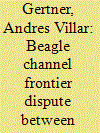

|
|
|
|
|
| Publication |
2014.
|
| Summary/Abstract |
The Beagle Channel crisis (1977-1984) unfolded in a global political context. In other words, it was never solely a bilateral matter between Argentina and Chile, as many analyses have suggested. From the international arbitration to the participation of a third actor (the Vatican), the role of the United States, the Falklands war and the United Kingdom, the Beagle crisis had pronounced regional and international dimensions. Domestic structures and international conditions affected the Argentinian and Chilean foreign policies to different degrees. The Beagle crisis resolution has been explained by reference to the key role played by the Vatican. However, recently declassified US documents and interviews with key actors reveal a different story. International sanctions for human right violations were affecting both countries' leverage in the international community and creating internal political problems. This finding suggests that both countries were keen to use mediation as a strategy to remove human rights violations from the US agenda.
|
|
|
|
|
|
|
|
|
|
|
|
|
|
|
|
| 2 |
ID:
132020
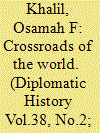

|
|
|
|
|
| Publication |
2014.
|
| Summary/Abstract |
In this paper, I argue that the "Middle East" is an ideational construct maintained by geographical, intellectual, and ideological representations. I assert that the geographical boundaries of the area called the Middle East have shifted over the past century to reflect the strategic interests of the major hegemonic power in the region, initially Britain and later the United States. Drawing on published and archival sources, I trace the etymology of the "Middle East" and its accompanying geographical representations and their relationship to key American and British foreign policy decisions and declarations. I also discuss how the Arabic translation of the "Middle East," or al-Sharq al-Awsa?, has been adopted and contested by scholars and journalists in the region.
|
|
|
|
|
|
|
|
|
|
|
|
|
|
|
|
| 3 |
ID:
132021
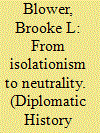

|
|
|
|
|
| Publication |
2014.
|
| Summary/Abstract |
This essay assesses the pitfalls of relying on isolationism to describe American political culture during the 1920s and 1930s and proposes that the concept of neutrality offers a more useful framework for understanding how Americans struggled with their place in a world at war. Americans had long worried about foreign entanglements, but what lent the debates after World War I their special urgency and potency was a sense that one important option in the traditional conduct of international relations-neutrality-had become unhinged from its moorings. Understanding the shifting meanings, and ultimately the perceived demise of neutrality as a viable form of statecraft, points toward a new way to narrate the turning points and political alliances of the interwar years. It also helps to explain why, since the 1930s, Americans have become more readily embroiled in military conflicts overseas despite their recurring doubts about the price of such engagement.
|
|
|
|
|
|
|
|
|
|
|
|
|
|
|
|
| 4 |
ID:
133280
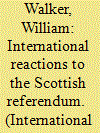

|
|
|
|
|
| Publication |
2014.
|
| Summary/Abstract |
The referendum on whether Scotland should become an independent country will be held on 18 September 2014. This article reflects on the evolution of foreign governments' attitudes towards the referendum since its confirmation in October 2012, and on their expectations should a 'yes' vote result. With few exceptions, they have adopted a policy of non-intervention, treating the referendum as the UK's domestic affair. President Obama's expression on 5 June 2014 of his desire for the UK to remain 'a strong, robust, united and effective partner' may, however, be seen as a sign of increasing apprehension abroad. Concerns of foreign governments aroused by the referendum include the diminution of the UK's power and role in international affairs, the possible encouragement of other secessionist movements, and disturbance to international organizations and alliances. It is commonly assumed that Scotland would become a reasonably prosperous and reliable small state. But how would the rest of the UK (rUK), a much more powerful and populous country, respond to 'the loss of Scotland'? How would it affect the UK's already unsettled relations with the EU, including the prospect of a referendum on EU membership? Despite many uncertainties and a febrile political atmosphere, it is widely expected abroad that Scotland and rUK would settle into a cooperative relationship after a difficult transitional period, and that an independent Scotland would be accepted into the EU and NATO if it displayed flexibility on important issues.
|
|
|
|
|
|
|
|
|
|
|
|
|
|
|
|
| 5 |
ID:
132918
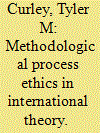

|
|
|
|
|
| Publication |
2014.
|
| Summary/Abstract |
In this review essay, I identify a commonality between Patrick Thaddeus Jackson's The Conduct of Inquiry and Daniel J. Levine's Recovering International Relations: an ethical methodological process to organize international theories in ways that promote a plurality of visions. Jackson's ideal-typification of the various methodological approaches in international relations encourages a pluralistic science. Likewise, Levine's constellation method demands a multiplicity of theoretical perspectives, in order to sustain the critical elements intrinsic to each. As I argue, this shared methodological process ethic not only advances theoretical pluralism but, in so doing, actively opens thinking space for constructing alternative political realities.
|
|
|
|
|
|
|
|
|
|
|
|
|
|
|
|
| 6 |
ID:
133282
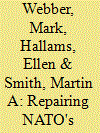

|
|
|
|
|
| Publication |
2014.
|
| Summary/Abstract |
NATO moves toward its next summit (to be held in Newport, Wales in September 2014) in a mood of anxiety and uncertainty. This is not simply because telling questions are being asked of the alliance in relation to Afghanistan and Ukraine, but because the twin motors which have sustained NATO now show signs of considerable wear and tear. The first of these motors relates to principles of purpose. This encompasses the activities (or purposes) which NATO has consciously pursued in the last 25 years: namely, operations, enlargement, partnership, transatlanticism and security. The second is principles of function: the means, in other words, by which NATO is kept in motion. Here, American leadership, cohesion and trust, burden-sharing and credibility all matter. These motors are not about to completely break down (NATO has underlying strengths which make that unlikely) but they do need attention. NATO's good health requires it to focus on a series of core tasks-what this article refers to as readiness, reassurance and renewal. These three tasks speak to an agenda of consolidation and preservation, rather than one of task expansion. But this is not a conservative agenda; grasping the nettle of prioritization and focus requires, in itself, a certain foresight and enterprise. Managed successfully, it is an agenda that will preserve and strengthen NATO in what are increasingly troubled times.
|
|
|
|
|
|
|
|
|
|
|
|
|
|
|
|
|
|
|
|
|